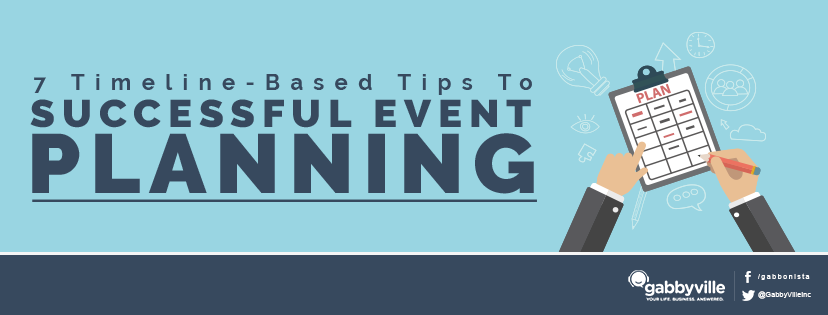Time check: 2 hours, 13 minutes before the event starts.
As of right now, there’s still no word from the caterer, the chairs haven’t been delivered yet, you just found out that one of the keynote speakers is down with the flu, and the host is still stuck in traffic.
That’s right — just 2 hours, 13 minutes before your company’s worst event nightmare is realized.
Wouldn’t it be a more perfect world if all our events went exactly as planned?
Yes, event planning is back-breaking business. You obviously want your company or brand’s event to make a great impression, regardless if it’s relatively small or one of a grander scale.
And as with all tough tasks, we need all the help we can get to make it as smooth sailing as possible.
We’ve compiled 7 timeline-based tips every event planner should keep in mind:
No. 1 — Determine the Need for an Event
(4-6 MONTHS BEFORE THE EVENT)

There are many whys and whats an event planner needs to satisfy. Why is there a need to hold an event? What is the main objective? Who would be working on it? Is there a budget? If you won’t be able to answer these important questions (and more), then you may want to rethink if you’d like to push through with it.
But if you were able to answer all the preliminary queries about your event without breaking a sweat, then you need to start preparing for it 4-6 months prior.
At this point, make sure that you:
✓ Have an event committee and chairperson
✓ Establish each committee member’s role and responsibilities
✓ Schedule regular committee meetings (and don’t forget the minutes of the meeting!)
✓ Allocate a budget
✓ Determine the type of event (is it a formal fund-raiser? A product launch? A business dinner?)
✓ Pick an event date
✓ Book your venue
✓ Identify and book your speaker (if you need one), hosts, and special guests
✓ Identify corporate sponsors and request for their logos (for banners)
✓ Determine the guest list
No. 2 — Contact and Communicate
(3-5 MONTHS BEFORE THE EVENT)

We can’t stress this enough — the key to a successful event is constant and clear communication. And 3-5 months before the event, it’s normal for the initial excitement to dissipate for some of your team members.
Also, this is the best time to contact people and businesses who will work with you during the event.
At this point, make sure that you:
✓ Have all your communication collaterals created, printed, readied and sent out (to those that apply). And by this, we mean:
- Formal Invitations
- Save-the-date cards
- Email invites
- Social media announcements
- Event map or directions to reach the event venue from different routes
- Pre-event posters
- Banners (to be put up during the event)
- Signages for pedestrians and vehicles (ask your venue what they would allow/require)
- Registration template
- Write your event programme
- Have a publicity plan (utilize social media channels to create hype or contact local press to write about your event to generate hype)
- Have press release articles written, checked, and distributed
- Plan for promo items or giveaways to VIPs and guests
✓ Get documented arrangements with important vendors who handle:
- Chairs, tables, podium (if they are not provided by the venue)
- Audiovisual equipment (lighting, projector, computer, sound system)
- Decorations (flower arrangements, stage design, etc.)
- Catering (get a menu plan, schedule menu tasting if needed)
- Entertainment (will there be a live band?)
- Ushering and guest relations
- Safety and security
- Transportation (will you offer free shuttle services to and from the venue?)
- Parking
- Photography and videography (look specifically for photographers/videographers with event coverage experience)
No. 3 — Find and Furnish
(1-2 MONTHS BEFORE THE EVENT)

With just a few weeks of breathing room, arrangements for the event should already be in order. This is the perfect time to review the complete event plan with the whole planning committee and look for anything you’ve missed. Get your magnifying glasses and polish up your event plan.
At this point, make sure that you:
✓ Assign and document point persons who will be in charge of communicating with each vendor
✓ Finalize your event programme AKA master plan
✓ Create a list of ushers, organizers, and everyone else who will be working on the day of the event
✓ Create a seating chart for guests
✓ Purchase giveaways
✓ Create your guest speaker’s speech (or write key notes that he or she can discuss)
✓ Review all your security and parking arrangements
✓ Start designing table names for guests
No. 4 — Confirm and Anticipate
(1 WEEK BEFORE THE EVENT)

The event is fast approaching — you’re on the seven-day countdown! Take this time to lock down documented confirmations for all your arrangements. This is also the time to anticipate all the things that could possibly happen (or go wrong) and create contingency plans. Get your thinking caps and put your brains on percolate.
At this point, make sure that you:
✓ Have confirmations for all arrangements with vendors via your team’s assigned point persons
✓ Confirm the final guest count and forward it to the caterer (it’s a good idea to add at least 10 extra meals and seats than the confirmed count)
✓ Print badges for ushers, IDs for organizers, registration documentation, seating charts and plates
✓ Have a list of backup ushers, organizers, and volunteers
✓ Brief all concerned parties of their respective roles before, during and after the event
✓ Confirm media/ local press’ attendance
No. 5 — Finalize and Tweak
(1 DAY BEFORE THE EVENT)

The big day is on the morrow! And if you’ve followed your master plan to the T, you should be able to get a good night’s rest tonight. But before you do, take the whole day to finalize all aspects of your plan and make it stellar. It’s time to make last minute adjustments and tweaks to your event’s needs.
At this point, make sure that:
✓ You check all signages, tables, chairs, decoration, and audiovisual needs are in place in the venue.
✓ Ensure that all giveaways are packed, ready to be distributed, and are on-site
✓ The registration table is stocked with all necessary documents/ items
✓ Send reminder emails to local press/media attending the event
✓ All organizers and point persons have a copy of the event programme, including: special instructions, important phone numbers, guest and VIP lists, and seating charts
No. 6 — The Big Day!
(DURING THE EVENT)

Today’s the day! The months of hard work comes down to this day. To keep things as organized and as stress-free as possible for you and your whole team, you should arrive early at the venue and have a meeting/pep talk before the event starts. All point persons should make sure that their designations are all set.
At this point, make sure that:
✓ All point persons are on top of their designations and are ready to give a brief status report
✓ All audiovisual and lighting equipment are working
✓ Re-check tables, chairs, decorations, etc.
✓ Catered food quantity and quality are checked
✓ Vendors’ attendance are confirmed
✓ You have enjoy the event!
No. 7 — Evaluate and Elevate
(AFTER THE EVENT)

The event has concluded successfully, and everyone has gone home with smiles on their faces, which is simply awesome. This is the perfect time to evaluate the event and list down points for improvement for the next one. And most importantly, give gratitude to all those who worked hard to make the event simply stellar.
At this point, make sure that you:
✓ Write personalized thank you notes to:
✓Event Team Organizers and Volunteers
✓Sponsors
✓Speakers
✓Guests
✓Media/ Local Press
✓Vendors
✓ Write a detailed evaluation of the event with suggestions for improvement
✓ Conduct a post-event survey with the whole team and with guests
✓ Create a post-event press release article and publish photos of event
✓ Gather all financial information related to the event, including receipts and reports
With these seven timeline-based tips, event planning will no longer be nightmarish. Who knows, if you master all these steps, you might even make a living out of it.





